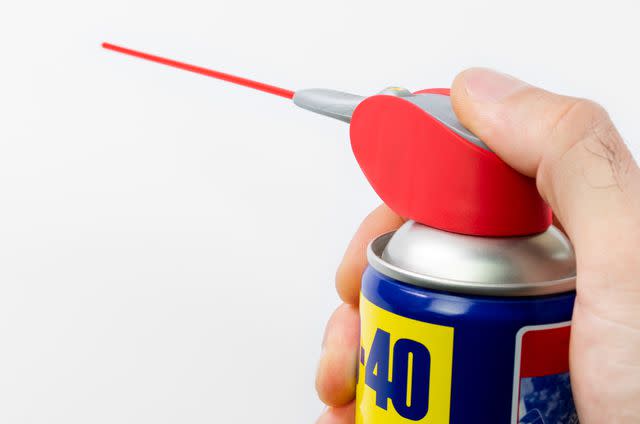7 Household Items To Use When You Don’t Have WD-40

No WD-40? No worries. These substitutes have your creaks and squeaks covered.
WD-40 is a home repair staple for good reason—that reason being the fact that a creaky, squeaky door can be a constant, hard-to-ignore annoyance to many people. The lubricant can be used on many different surfaces to soothe screeching door hinges, windows, ceiling fans, and machinery, as well as to prevent rust and corrosion on metal materials and tools. However, if you happen to find yourself without WD-40, there are easy household replacements that you most likely already have at home.
Here are the 7 best substitutes for WD-40 for when you need a quick fix.

Getty Images/Nariman Safarov
Cooking Spray
Who knew that a trusty canister of PAM could go beyond the kitchen? Perhaps the quickest fix of them all, cooking spray makes for the perfect grab-and-go replacement when you’re in a pinch. Simply spritz the area of concern to alleviate squeaky hinges instantly, all without getting your hands dirty. There’s also no need to worry about any pets or small children that might come across the applied areas later since it's safe to consume.
Vegetable Oil
This pantry staple is another lubricant alternative to WD-40 that can be easily applied without having to purchase another product. Mostly any cooking oil can be used, and vegetable oil has the added perk of being safe to use on most surfaces, including metal and plastic. Since it’s ingestible, you also don’t need to worry about using it in the kitchen, or around pets. Simply dip a paper towel in a small amount of oil, and apply to the desired area.
Vaseline
It’s no secret that there are many Surprising Ways To Use Vaseline In Your Home, but you can consider it a go-to idea when you are out of WD-40, too. Vaseline, or petroleum jelly, can be a huge help to add much-needed lubrication to door hinges and window sash locks. Simply apply a thin amount all over the target area, and reapply every few months as needed.
Coconut Oil
Most cooking oils are fair game when it comes to household lubrication. However, coconut oil is different because it has a natural texture that's more similar to petroleum jelly, which can be easier and less messy to apply than traditional liquid oil. It goes from solid to liquid, and vice-versa, easily. In either form, it will work like a charm.
Beeswax
For those desiring a natural substitute for WD-40, beeswax is an incredibly versatile option to keep around the house for various projects. (You can even make DIY lip balm from it!) Another more pliable-yet-solid choice, it can be applied to nuts, bolts, and hinges to keep from creaking. You can even use it on tools to help prevent rusting.
Mineral Oil
There are many reasons why you might have mineral oil on hand, whether for beauty purposes or removing sticky substances. Like most oils, it is a lubricant by nature and can be used on plastic and metal surfaces to reduce friction and prevent rust and corrosion.
Plumber’s Grease
You might have this hidden under your sink for all of your plumbing needs. It was designed to be used to protect plumbing fixtures and pipes from corrosion, wear-and-tear, and leaks. However, since it is a silicone-based lubricant, it can be used on other surfaces when needed, particularly rubber or plastic surfaces. It is also water-resistant, which could be helpful for outdoor doors and machinery.
For more Southern Living news, make sure to sign up for our newsletter!
Read the original article on Southern Living.

